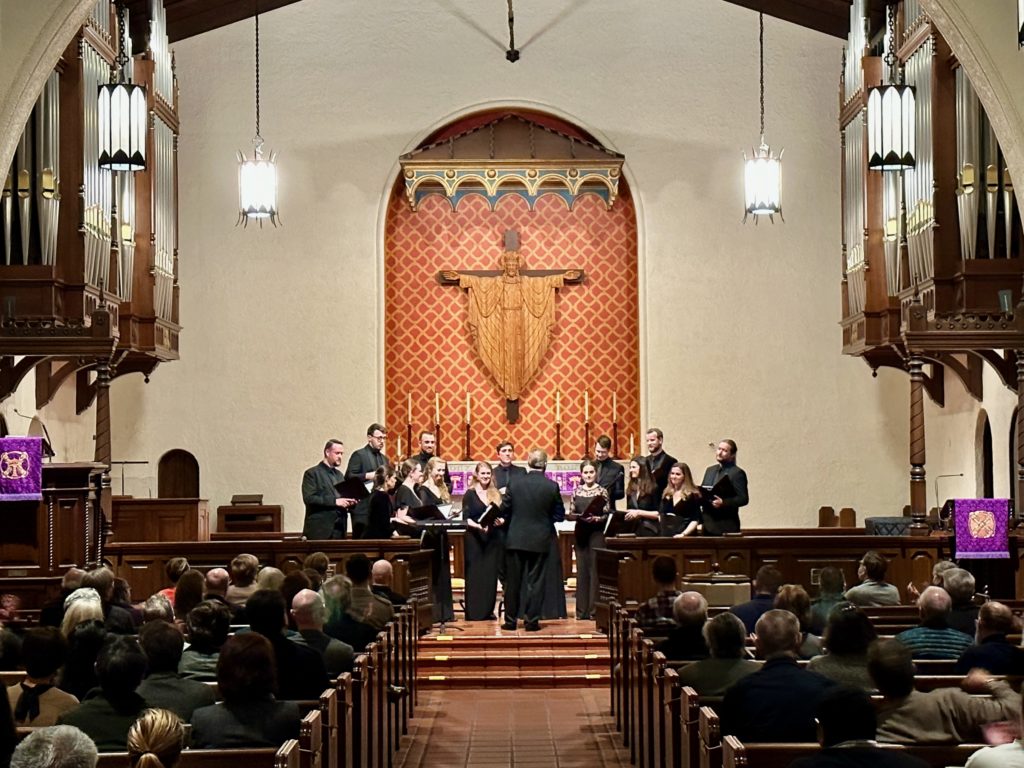Tenebrae Brings British Choral Radiance to La Jolla’s St. James by-the-Sea
Tenebrae, the London-based professional choral ensemble, gave a stunning performance Sunday for La Jolla’s St. James Music Series. Under the astute direction of their founder Nigel Short, these fifteen singers sang their substantial program of sacred music with remarkable discipline as well as a technical flair that could evoke in their Renaissance motets the tonal purity of one of those storied English boy choirs, yet they easily unleashed the sonic brilliance of a seasoned opera chorus in Baroque and 20th-century works.
Performing Mikhail Glinka’s sublime “Hymn to the Cherubim,” in the blink of an eye Tenebrae shifted from meditative awe to radiant exultation, and, similarly, Gustav Holst’s dramatic setting of the traditional “Nunc Dimittis” canticle provided ample opportunity for the ensemble to revel in its confident dynamic versatility.At the center of Tenebrae’s rich program, John Tavener’s 1981 “Funeral Ikos” offered a profound insight into Orthodox spirituality. The “Ikos,” a lengthy text taken from the Greek Orthodox funeral service for priests—in an English translation by Isabel Hopgood—reveals a surprisingly existential confession of abject humility before the Eternal absolved by thrice repeated Alleluias at the completion of each of the six stanzas. Tavener, a zealous convert to Orthodoxy, captures of the solemn joy of the Greek liturgy by alternating simple chant with gently undulating parallel 3-voice chords musicians call faux-bourdon. The only thing lacking in Tenebrae’s glowing performance of “Funeral Ikos” was the pungent scent of incense wafting through the St. James-by-the-Sea sanctuary.
Since the state church of Norway is Lutheran, it is hard to imagine the utility of Edvard Grieg’s setting of the canticle “Ave Maris Stella,” but the composer set this traditional Latin hymn to the “Mother of God and star of the sea” as if it were gentle folk song. This was certainly a fitting choice for the St. James’ program, since the Roman Catholic Church just a few blocks from the Episcopal Church on Prospect is named Mary Star of the Sea.
In Tenebrae’s vibrant account of the muscular counterpoint and dark harmonic progressions of Antonio Lotti’s “Crucifixus,” a phrase taken from the Credo of the Latin Mass, I sensed the dramatic biblical scenes in the frescoes of St. Mark’s Basilica in Venice, where Lotti spent most of his musical career.
No a cappella ensemble would overlook the vast repertory of Renaissance motets, and Tenebrae included Alonso Lobo’s “Versa est in luctum,” Orlando di Lassus’ “Musica Dei Dominum,” and Gregorio Allegri”s “Miserere.” Nigel Short’s discerning direction maintained the elegant balance of the independent voices in these motets, while increasing their emotional impact by giving a slight advantage to his bright sopranos, the largest of the four sections.
Tenebrae closed with English composer William H. Harris’ 1925 double choir motet “Faire is the Heaven,” based on the ecstatic poetry of Edmund Spenser. One of the most widely admired gems of Anglican music, “Faire is the Heaven” provided a vibrant finale to a most rewarding Tenebrae program. The ensemble’s encore: Eric Whitacre’s “Sleep.”
This concert was presented by the St. James Music Series on Sunday, March 12, 2023, at St. James by-the-Sea Episcopal Church, La Jolla, CA.

